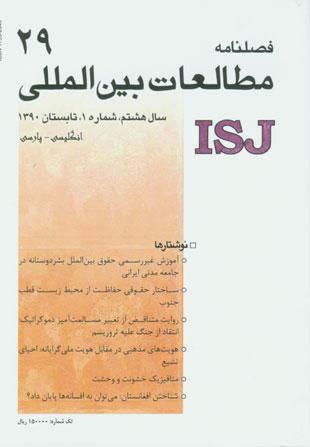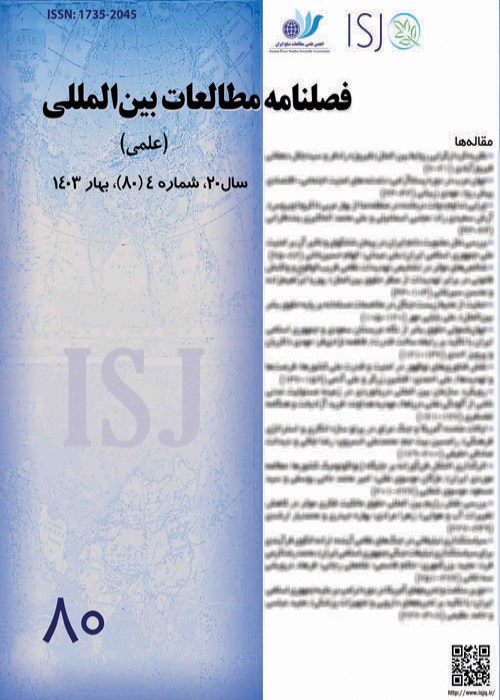فهرست مطالب

نشریه مطالعات بین المللی
سال هشتم شماره 1 (پیاپی 29، تابستان 1390)
- 138 صفحه، بهای روی جلد: 80,000ريال
- تاریخ انتشار: 1390/05/20
- تعداد عناوین: 6
-
-
صفحه 95
-
Page 1Due to human dignity and the necessities of human rights respect, we should find the best ways for promoting human rights and international humanitarian law. The Iranian civil society as one of international community member has always been eager to learn human rights and international humanitarian law (IHL). Political and economic features of Middle East add to importance of promoting and training humanitarian law in Iran. The main question is how can we institutionalize training international humanitarian law in the country like Islamic Republic of Iran? Researchers believe that official education is more helpful. Despite the author believes that the unofficial educations are more effective in institutionalizing humanitarian law in an Islamic Iran. To test this theory, the researcher uses observation, test and assessment of research results with regard to training humanitarian law in Iran. Also, texts related to official and unofficial modern education of humanitarian law, as well as modern methods for training humanitarian law will be studied and compared with traditional methods used to teach humanitarian law.Keywords: Iran, Islam, IHL, Unofficial Training, Simulation, War, Geneva Conventions, Civil Society
-
Page 19In the fifty years that have lapsed since the adoption of the Antarctic Treaty (Washington, 1 December 1959), a wide-ranging scheme of environmental protection measures has been developed and consolidated for this fragile ecosystem. While environmental concerns were not highlighted between the principles and objectives initially included in the treaty, they were the object of a comprehensive and innovative system for protecting the environment drawn up only a few years later. The 1991 Protocol to the Antarctic Treaty created the first ever integrated system for environmental protection. The protocol is elaborated on and supplemented by its six annexes. How is this system articulated? What are its chief characteristics? How has it adapted to the Antarctic area’s new needs and its environs? How effective would it be in the event of an environmental emergency? These are a few of the questions that this article attempts to answer.Keywords: Antarctic System, Antarctic Treaty, Madrid Protocol, Environmental Protection, Environmental Emergency, Liability
-
Page 39The 2011 uprisings sweeping across the Middle East and North Africa have rendered the old bargain with local autocrats obsolete. The Arab awakening is likely to revive pro-democracy movements in some countries of the region and cause new identities to surface among others. The Obama administration considers the counter-narrative of peaceful democratic change the most effective way to undermine the ability of terrorist groups and networks, such as al-Qaeda, to operate and recruit. This is a safe bet, even as the region’s complexity presents problems to its enduring success. We argue that the right to depose unjust rulers, recognized as one of the central tenets of many Islamic teachings, should be exercised by local people. Military intervention and the global campaign against terrorism are costly, destabilizing, and counter-productive. It is important to understand the limits to military solutions and seek multilateral legal and political solutions in confronting terrorism. It should also be noted that the use of force can be justified on humanitarian grounds in the cases of massacre and ethnic cleansing.Keywords: Terrorism, Human Rights, Democracy, Al, Qaeda, Military Intervention
-
Page 71A relevant topic with significance that goes beyond Middle East. There is an urgency to examine the images of Self and Other that animate identities. Nationalism in this sense is a secure identity defined and limited by the state. The central argument of this study questions the political thought that constitutes the nation-state. It involves critical readings of Hobbes, Locke, the utilitarian philosopher Jeremy Bentham and Hegel. Despite presumptions of universality the focus on individual, the nation or the ‘way of life’ eventually becomes ‘my life’, my freedom, my security versus the rest of the human race. This study is divided into three parts. First part is introduction which defines the theoretical framework, methodology and key concepts. Part two provides concrete historical and episodic substance to challenge the notion of Shia revival. This study provides the oppositional view that Shia Islam is quietist, defensive, and nonviolent. Moreover there does not exist a conflict between national and religious identity in Islam. Iran indeed represents a unique case study where in Khomeini himself stated if a conflict arises between interests of umm al qura (homeland) and those of principles of Islamic universalist then interests of umm al qura will take precedence. Part three is conclusion. Underlying assumption is that dominant conceptual framework within which we understand Nationalism and religion are in adequate and dangerous. Categories that shape our understanding of Shisim, politics, power and violence are questioned in this study. The conceptual understanding of what constitutes a ‘Shia’ and the meaning of powerful political concepts can not be easily universalized.Keywords: Identity, Shisim, Nationalism, Religion, Iran, Islam
-
Page 95Qaddafi warned the NATO forces that soon he will mobilize an army of invisible “Jinns” to confront the infidel intruders to a Moslem land. Throughout the history of mankind, political rulers have abused the supernatural beliefs and metaphysical forces in order to establish their power over the life of people. Terror and violence are terms that have existed all along with the development human society from primitive times to the present. Gradually, before reason became as the ground foundation for “civil society”, religion and metaphysics dominated the realm of knowledge of the world and its various sophisticated phenomenon. What are the principal causes of these acts of terror and violence that seem to be inseparable part of human societies? The main argument in this paper is that violence, terror and atrocities such as September 11 events, suicide attacks and other mass killings, executions and the likes, should be explained and understood only within the purview of “metaphysical paradigm” and not necessarily through conventional rational approaches.Keywords: Libya, Reasons, Metaphysics, Terror, Jinns, Democracy
-
Page 111War on terrorism, as the motto which formed the cornerstone of global policies of former neo-conservative administration of the United States, is increasingly becoming ineffective in Afghanistan with the dreaded consequence of spilling over into Pakistan. This inevitable consequence of War on Terrorism in Afghanistan has brought the West face to face with the ‘nest of terrorism’ that CIA built in Pakistan’s so-called madrasas of extremist Wahhabi teachings in the first place, with the enthusiastic assistance of Nawaz Sharif’s government in Pakistan, the Al-Saud of Saudi Arabia and the Al- Nahyan of the United Arab Emirates in late 1990s. In their evil planning they found it necessary to invent a state history for Afghanistan based on former British colonial designs for the region during their geopolitics of Great Game with Russia in 19th century. They invented the Afghan state by putting together territories they severed from the veining Persian Empire of the time. This process of state-manufacturing in Afghanistan though served the colonial purposes at the time, never proved to be working in the sense that is expected of a genuinely founded nation and nation-state. The ills of this ill-designed state will naturally disallow any remedy that is not based on a genuine state-building process in that country. To produce such a remedy Afghanistan needs to address the ills of its statestructure by pinpointing the centrifugal forces that drives various ethnicities apart and to try and find some kind of accommodation among components that makes up the state of Afghanistan. The best method to achieve this in today world of politics would probably be a genuinely designed federalism.Keywords: Afghanistan, Britain, Iran, State, building, Nationbuilding, USA, Taliban, Terrorism, War, Kabul, Security


